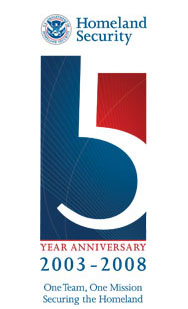
| Home | Information Sharing & Analysis | Prevention & Protection | Preparedness & Response | Research | Commerce & Trade | Travel Security & Procedures | Immigration |
| About the Department | Open for Business | Press Room |

The threat level in the airline sector is High or Orange. Read more.

Release Date: 08/05/03 00:00:00
For Immediate Release
Office of the Press Secretary
August 5, 2003
In recognition of the importance of securing our nation's urban areas, the Bush Administration has partnered with Congress to provide substantial federal resources to selected urban areas across the country including the National Capital Region (NCR). The Urban Area Security Initiative (UASI) Program is designed to enhance the ability of first responders and public safety officials to secure the area's critical infrastructure and respond to potential acts of terrorism. This mission requires coordination, cooperation and focused effort from the entire region - citizens, all levels of government, as well as the private and non-profit sectors. This program includes a jurisdictional assessment and calls for the development of an Urban Area Security strategy development component to ensure that the funds are being used to fund the region's priorities.
The NCR received a total $60,490,851 from the UASI. In addition communities throughout the NCR have benefited from other funding sources including the State Homeland Security Grant Program. In the few months since the announcement of the grants, the NCR has accomplished many of the grant requirements and is leading the country in demonstrating the coordinated planning effort necessary to maximize the regional impact of these resources. Below are some of the highlights from the UASI Program within the National Capital Region.
The planning efforts will ensure preparedness efforts across the NCR are fully coordinated and appropriately integrated so that activities are consistent, non-duplicative, efficient and effective. The Urban Area Working Group (working with and through the Emergency Preparedness Council) will provide a forum and convene record and support the coordination of regional preparedness planning efforts. Specific efforts will engage regional associations and groups to synchronize existing efforts that address evacuation planning, bio-detection and syndromic surveillance planning, and citizen preparedness planning within the NCR. The group also is developing and coordinating detailed operations plans that include a communications strategy with business rules for interoperable communications (data and voice) and a regional emergency operations center, as well as encouraging the non-profit community to identify and coordinate their roles in support of regional response and recovery efforts.
The training goal is to provide coordinated, consistent, standardized training to meet regional homeland security training requirements for responders, government officials, schools and the public. A training strategy will organize and coordinate the actions of all training academies and institutions in the NCR to ensure training goals are achieved. Additionally, efforts include partnering with the American Red Cross to address the concerns of educators and caregivers who need additional tools to help children cope during disasters; implementing a regional citizen education/awareness campaign; and training for the region's media on how best to communicate with the region's citizens during emergencies while protecting themselves against new and challenging threats.
The goal of the equipment program is to ensure that the NCR public safety community is properly equipped to perform during incidents resulting from terrorism or use of weapons of mass destruction (WMD). A regional equipment program that augments the equipment of the individual NCR jurisdictions will be developed. A centralized regional equipment quartermaster will allow jurisdictions within the NCR to obtain additional equipment and ensure that personal protective equipment is available to all NCR public safety personnel.
The NCR will establish a comprehensive program to include a calendar for terrorism and security-related exercises across the Region that is inclusive of all levels of government, as well as schools and universities, health care institutions, and other private and nonprofit partners as appropriate. The NCR will regularly exercise response capability to ensure continued improvement through a rigorous corrective action program, measure current capability and provide realistic training to area responders, government officials and the public.
Fact Sheet: National Capital Region Coordination
This page was last modified on 08/05/03 00:00:00